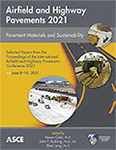Comparing Binder Modified with Recycled Plastic to Conventional Polymer Modified Binders
Publication: Airfield and Highway Pavements 2021
ABSTRACT
This research compared two recycled plastic products to conventional polymers commonly used for bituminous binder and asphalt mixture production. Samples of the same penetration grade bitumen were modified with 6% of the recycled plastic products, as well as 2%–6% of conventional elastomeric and plastomeric polymers. Testing included index properties and rheological properties used in the United Kingdom and the United States. The results were compared to determine the dosage of conventional polymer that was equivalent to 6% recycled plastic. It was found that 6% recycled plastic was generally equivalent to 3%–6% conventional plastomeric polymer. Although some properties were also comparable to those associated with 3%–4% conventional elastomeric polymer, the force ductility was significantly lower, indicating lower asphalt crack resistance. It was concluded that these recycled plastic products should be considered as a sustainable source of plastomeric polymer for the modification of bituminous binders, rather than as simple binder extenders.
Get full access to this article
View all available purchase options and get full access to this chapter.
REFERENCES
Austroads. 2014a, Effects of Hot Storage on Polymer Modified Binder Properties and Field Performance, AP-T271-14, Sydney, New South Wales, Australia, 8 September.
Austroads. 2014b, Guide to Pavement Technology: Part 4B: Asphalt, AGPT04B-14, Sydney, New South Wales, Australia, 6 June.
Austroads. 2019, Viability of Using Recycled Plastics in Asphalt and Sprayed Sealing Applications, AP-T351-19, Sydney, New South Wales, Australia, October.
Brasileiro, L., Moreno-Navarro, F., Tauste-Martinez, R., Matos, J., and Rubio-Gamez, M. 2019, ‘Reclaimed polymers as asphalt binder modifiers for more sustainable roads: A Review’, Sustainability, vol. 11, pp. no. 646.
Jamshidi, A., and White, G. 2019, ‘Use of recycled materials in pavement construction for environmental sustainability’, Eighteenth Annual International Conference on Pavement Engineering, Asphalt Technology and Infrastructure, Liverpool, England, United Kingdom, 27-28 February.
Jamshidi, A., and White, G. 2020, ‘Evaluation of performance of challenges of use of waste materials in pavement construction: a critical review’, Applied Sciences, vol. 10, no. 226, pp. 1-13.
Lewis, H., Verghese, K., and Fitzpatrick, L. 2010, ‘Evaluating the sustainability impacts of packaging: the plastic carry bag dilemma’, Packing Technology and Science, no. 23, pp. 145-160.
MacRebur. 2020, ‘MacRebur Products’, Lockerbie, Scotland, United Kingdom, accessed 7 April 2020, http://macrebur.com/pdfs/product/MacReburProductSheet_v1.pdf.
Masad, E., Roja, K. L., Rehman, A., and Abdala, A. 2020, A Review of Asphalt Modification Using Plastics: A Focus on Polyethylene, Texas A&M University, Qatar, Doha.
McDaniel, R. 2020, ‘History of plastics in asphalt: an overview’, 99th Annual Meeting of the Transportation Research Board, Washington, District of Columbia, USA, 12-16 January.
NAPA. 2019, Sustainable Asphalt Pavements: A Practical Guide, National Asphalt Pavement Association, Geenbelt, Maryland, United States of America, November 2019.
Nizamuddin, S., Jamal, M., Gravina, R., and Giustozzi, F. 2020, ‘Recycled plastic as bitumen modifier: the role of recycled linear low-density polyethylene in the modification of physical, chemical and rheological properties of bitumen’, Journal of Cleaner Production, no. 266, pp. 1-12.
Shell. 2015, The Shell Bitumen Handbook, 6th edn, ICE Publishing, Italy.
White, G. 2015, ‘The Multiple stress creep recovery test for airport asphalt binders’, Road & Transport Research, vol. 24, no. 3, pp. 24-34.
White, G. 2019, ‘Quantifying the impact of reclaimed asphalt pavement on airport asphalt surfaces’, Construction and Building Materials, no. 197, pp. 757-765.
White, G. 2020, ‘A Synthesis on the effects of two commercial recycled plastics on the properties of bitumen and asphalt’, Sustainability, vol. 12, no. 8594, pp. 1-20.
White, G., and Hall, F. 2020, ‘Comparing wet mixed and dry mixed binder modification with recycled waste plastic’, RILEM International Symposium on Bituminous Materials, Lyon, France, 14-16 December, article-in-press.
White, G., and Hall, F. 2021, ‘Laboratory Comparison of Wet-mixing and Dry-mixing of Recycled Waste Plastic for Binder and Asphalt Modification’, 100th TRB Annual Meeting: a virtual event, January, article-in-press.
White, G., and Magee, C. 2019, ‘Laboratory evaluation of asphalt containing recycled plastic as a bitumen extender and modifier’, Journal of Traffic and Transportation Engineering, vol. 7, no. 5, pp. 218-235.
White, G., and Reid, G. 2018, ‘Recycled waste plastic for extending and modifying asphalt binders’, 8th Symposium on Pavement Surface Characteristics (SURF 2018), Brisbane, Queensland, Australia, 2-4 April.
Yin, F., Moraes, R., Fortunatas, M., Tran, N., Elwardany, M. D., and Planche, J.-P. 2020, Performance Evaluation and Chemical Characterization of Asphalt Binders and Mixtures Containing Recycled Polyethylene, Plastic Industry Association, 10 March.
Information & Authors
Information
Published In
Copyright
© 2021 American Society of Civil Engineers.
History
Published online: Jun 4, 2021
Authors
Metrics & Citations
Metrics
Citations
Download citation
If you have the appropriate software installed, you can download article citation data to the citation manager of your choice. Simply select your manager software from the list below and click Download.
